高中英语语法之8虚拟语气
图片预览
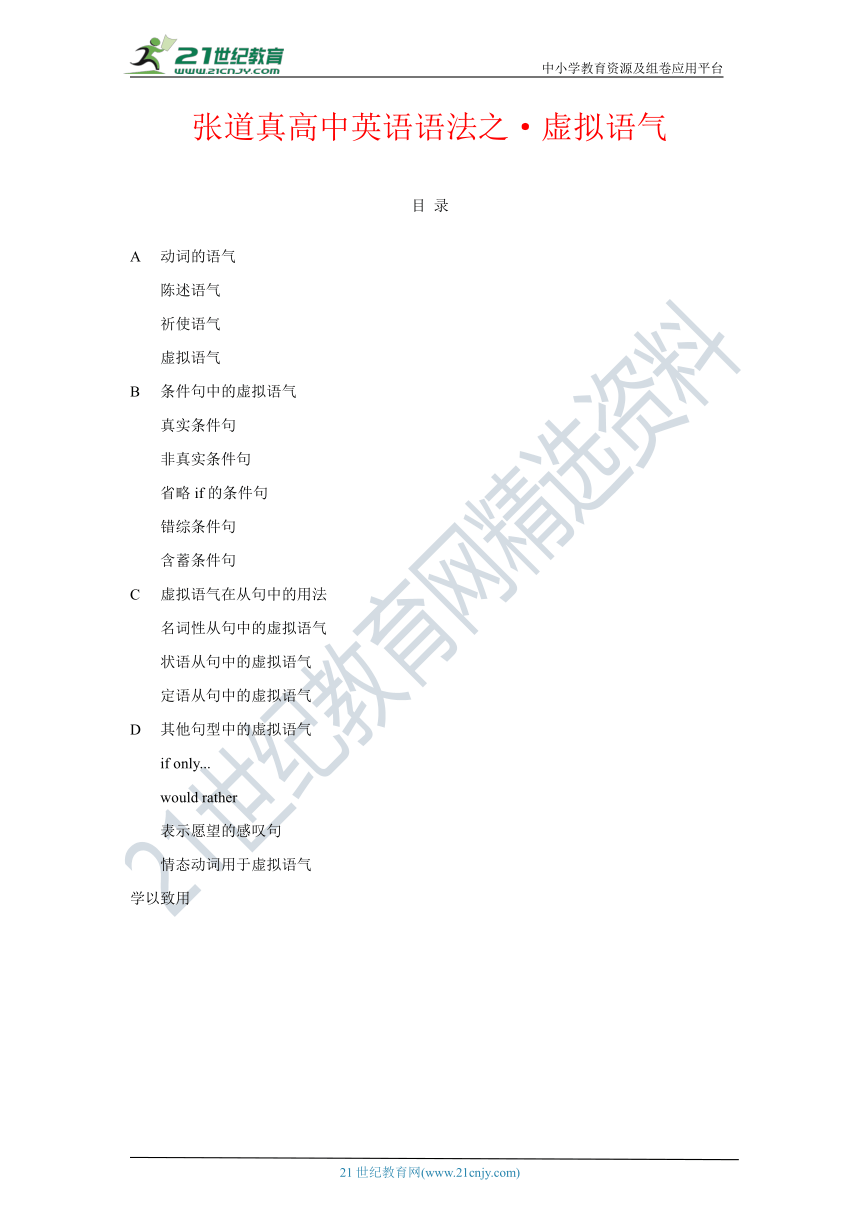
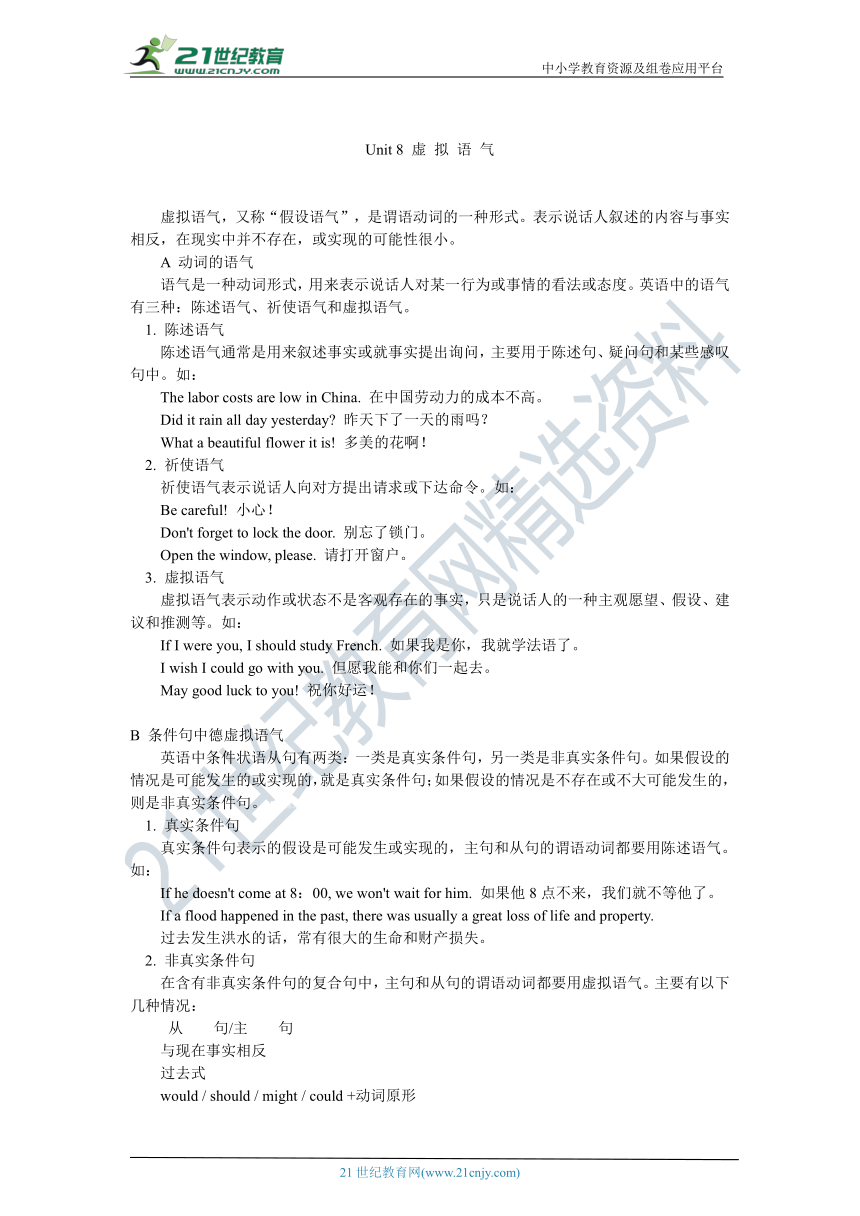
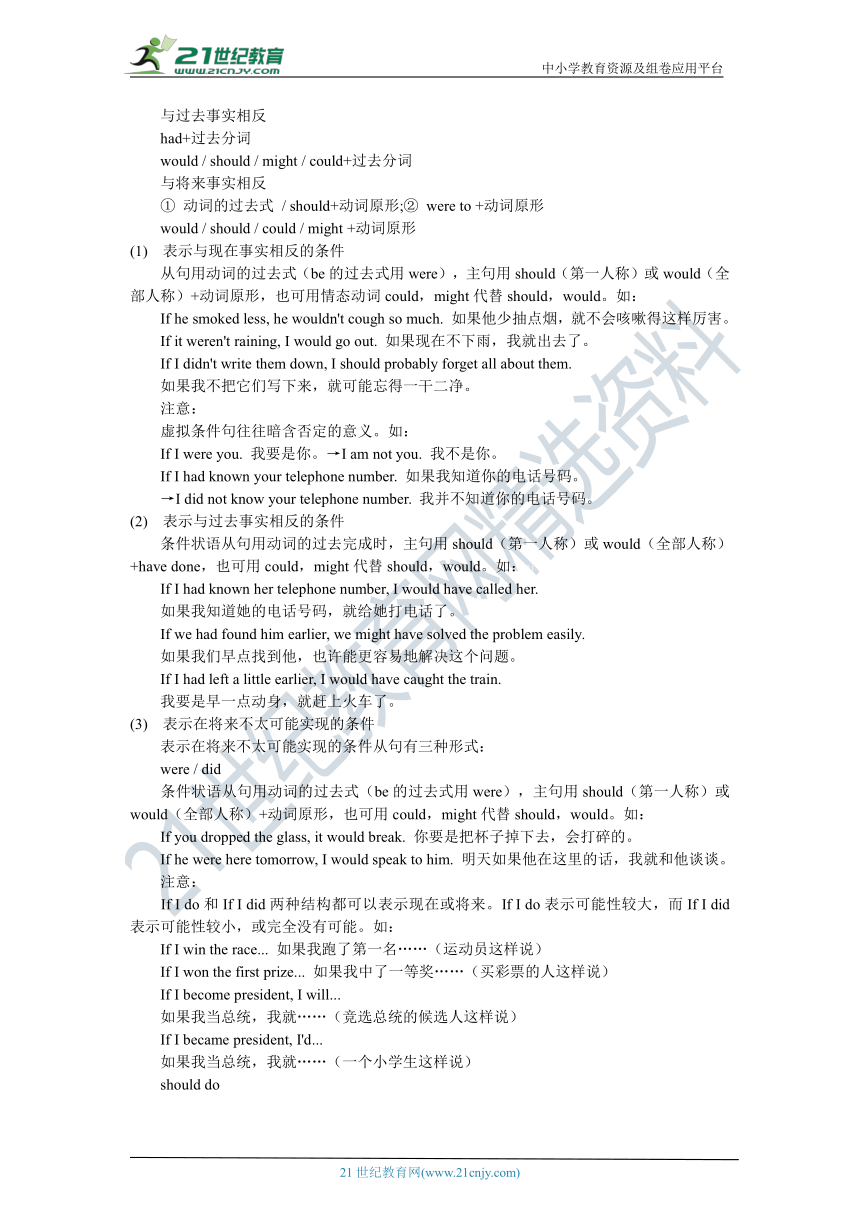
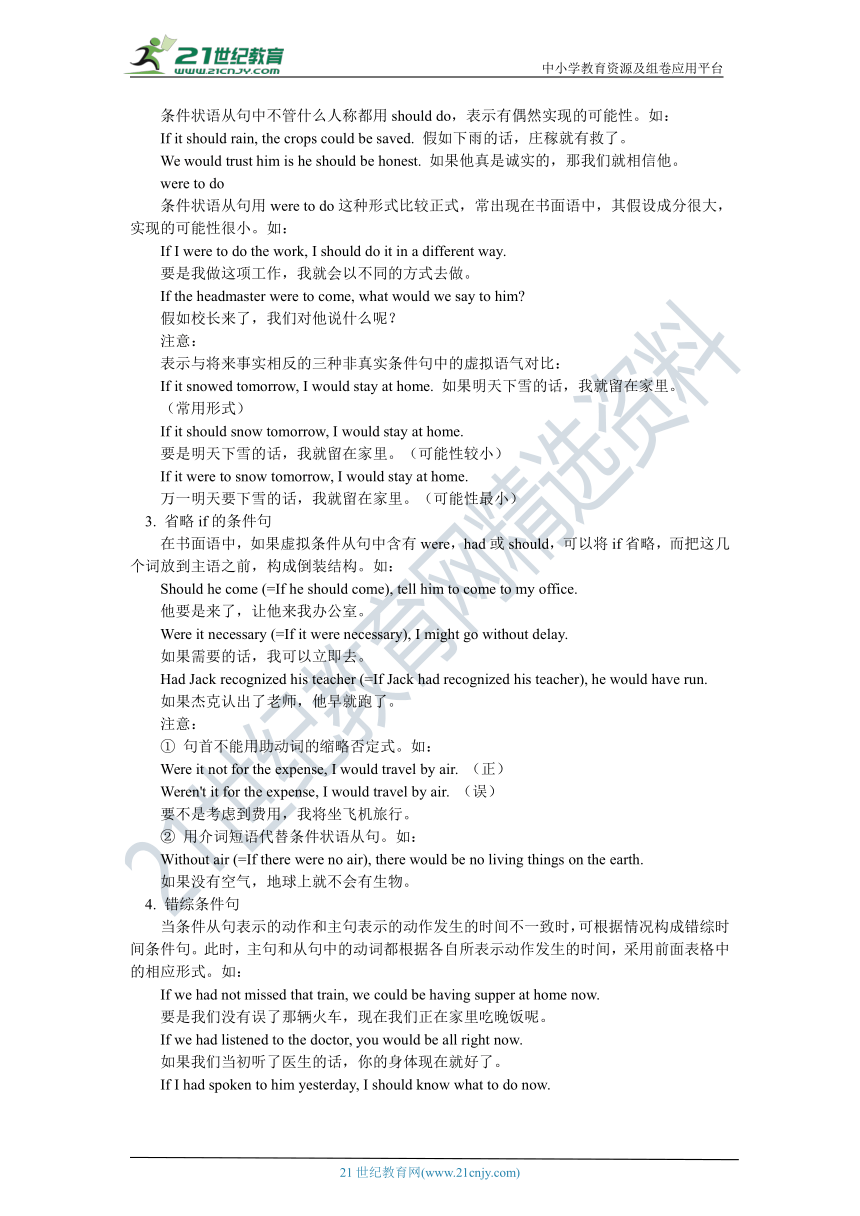
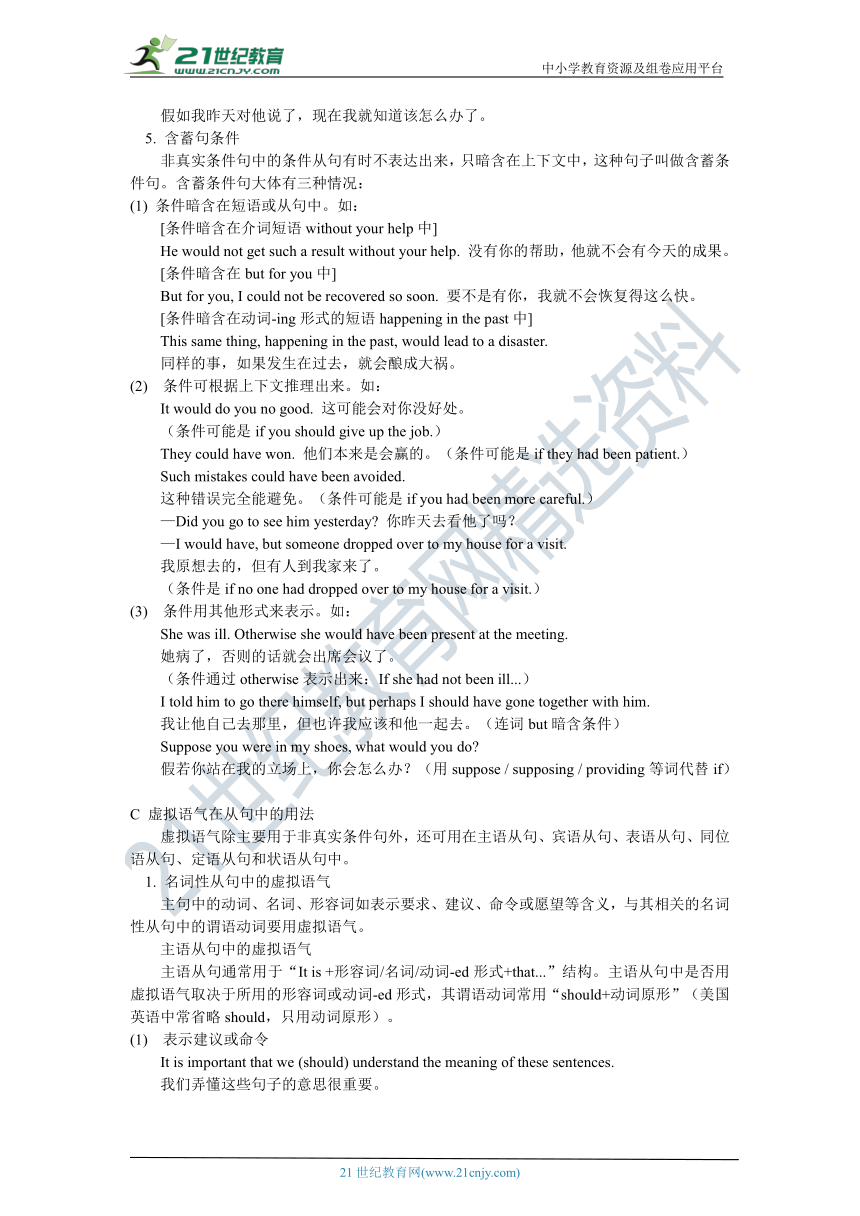
文档简介
中小学教育资源及组卷应用平台
张道真高中英语语法之·虚拟语气
目 录
A 动词的语气
????陈述语气
????祈使语气
????虚拟语气
B 条件句中的虚拟语气
????真实条件句
????非真实条件句
????省略if的条件句
????错综条件句
????含蓄条件句
C 虚拟语气在从句中的用法
????名词性从句中的虚拟语气
????状语从句中的虚拟语气
????定语从句中的虚拟语气
D 其他句型中的虚拟语气
????if only...
????would rather
????表示愿望的感叹句
????情态动词用于虚拟语气
学以致用
Unit 8 虚 拟 语 气
虚拟语气,又称“假设语气”,是谓语动词的一种形式。表示说话人叙述的内容与事实相反,在现实中并不存在,或实现的可能性很小。21cnjy.com
A 动词的语气
语气是一种动词形式,用来表示说话人对某一行为或事情的看法或态度。英语中的语气有三种:陈述语气、祈使语气和虚拟语气。21*cnjy*com
1. 陈述语气
陈述语气通常是用来叙述事实或就事实提出询问,主要用于陈述句、疑问句和某些感叹句中。如:
The labor costs are low in China. 在中国劳动力的成本不高。
Did it rain all day yesterday? 昨天下了一天的雨吗?
What a beautiful flower it is! 多美的花啊!
2. 祈使语气
祈使语气表示说话人向对方提出请求或下达命令。如:
Be careful! 小心!
Don't forget to lock the door. 别忘了锁门。
Open the window, please. 请打开窗户。
3. 虚拟语气
虚拟语气表示动作或状态不是客观存在的事实,只是说话人的一种主观愿望、假设、建议和推测等。如:
If I were you, I should study French. 如果我是你,我就学法语了。
I wish I could go with you. 但愿我能和你们一起去。
May good luck to you! 祝你好运!
B 条件句中德虚拟语气
英语中条件状_è?????????????¤?±?_:一类是真实条件句,另一类是非真实条件句。如果假设的情况是可能发生的或实现的,就是真实条件句;如果假设的情况是不存在或不大可能发生的,则是非真实条件句。【来源:21cnj*y.co*m】
1. 真实条件句
真实条件句表示的假设是可能发生或实现的,主句和从句的谓语动词都要用陈述语气。如:
If he doesn't come at 8:00, we won't wait for him. 如果他8点不来,我们就不等他了。
If a flo_od_hap_pened in the past, there was usually a great loss of life and property.
过去发生洪水的话,常有很大的生命和财产损失。
2. 非真实条件句
在含有非真实条件句的复合句中,主句和从句的谓语动词都要用虚拟语气。主要有以下几种情况:
从 句/主 句
与现在事实相反
过去式
would / should / might / could +动词原形
与过去事实相反
had+过去分词
would / should / might / could+过去分词
与将来事实相反
① 动词的过去式 / should+动词原形;② were to +动词原形
would / should / could / might +动词原形
(1) 表示与现在事实相反的条件
从句用动词的过去式_???be???è?????_式用were),主句用should(第一人称)或would(全部人称)+动词原形,也可用情态动词could,might代替should,would。如:
If he smoked less, he wouldn't cough so much. 如果他少抽点烟,就不会咳嗽得这样厉害。
If it weren't raining, I would go out. 如果现在不下雨,我就出去了。
If I did_n't_wr_ite them down, I should probably forget all about them.
如果我不把它们写下来,就可能忘得一干二净。
注意:
虚拟条件句往往暗含否定的意义。如:
If I were you. 我要是你。→I am not you. 我不是你。
If I had known your telephone number. 如果我知道你的电话号码。
→I did not know your telephone number. 我并不知道你的电话号码。
(2) 表示与过去事实相反的条件
条件状语从句用动词的过去完成_??????????????¨s_hould(第一人称)或would(全部人称)+have done,也可用could,might代替should,would。如:21教育名师原创作品
If I had known her telephone number, I would have called her.
如果我知道她的电话号码,就给她打电话了。
If we had _found__him earlier, we might have solved the problem easily.
如果我们早点找到他,也许能更容易地解决这个问题。
If I had left a little earlier, I would have caught the train. www-2-1-cnjy-com
我要是早一点动身,就赶上火车了。
(3) 表示在将来不太可能实现的条件
表示在将来不太可能实现的条件从句有三种形式:
were / did
条件状语从句_??¨??¨è?????è?????_式(be的过去式用were),主句用should(第一人称)或would(全部人称)+动词原形,也可用could,might代替should,would。如:
If you dropped the glass, it would break. 你要是把杯子掉下去,会打碎的。
If he were here tomorrow, I would speak to him. 明天如果他在这里的话,我就和他谈谈。
注意:
If I__do???If_ I did两种结构都可以表示现在或将来。If I do表示可能性较大,而If I did表示可能性较小,或完全没有可能。如:
If I win the race... 如果我跑了第一名……(运动员这样说)
If I won the first prize... 如果我中了一等奖……(买彩票的人这样说)
If I become president, I will...
如果我当总统,我就……(竞选总统的候选人这样说)
If I became president, I'd...
如果我当总统,我就……(一个小学生这样说)
should do
条件状语从句中不管什么人称都用should do,表示有偶然实现的可能性。如:
If it should rain, the crops could be saved. 假如下雨的话,庄稼就有救了。
We would trust him is he should be honest. 如果他真是诚实的,那我们就相信他。
were to do
条件状语从句用were to do这种形式比较正式,常出现在书面语中,其假设成分很大,实现的可能性很小。如:
If I were to do the work, I should do it in a different way.
要是我做这项工作,我就会以不同的方式去做。
If the headmaster were to come, what would we say to him?
假如校长来了,我们对他说什么呢?
注意:
表示与将来事实相反的三种非真实条件句中的虚拟语气对比:
If it snowed tomorrow, I would stay at home. 如果明天下雪的话,我就留在家里。
(常用形式)
If it should snow tomorrow, I would stay at home.
要是明天下雪的话,我就留在家里。(可能性较小)
If it were to snow tomorrow, I would stay at home.
万一明天要下雪的话,我就留在家里。(可能性最小)
3. 省略if的条件句
在书面语中,如果虚拟条件从句中含有were,had或should,可以将if省略,而把这几个词放到主语之前,构成倒装结构。如:
Should he come (=If he should come), tell him to come to my office.
他要是来了,让他来我办公室。
Were it necessary (=If it were necessary), I might go without delay. 【版权所有:21教育】
如果需要的话,我可以立即去。
Had Jack recogn_ized_h_is teacher (=If Jack had recognized his teacher), he would have run.
如果杰克认出了老师,他早就跑了。
注意:
① 句首不能用助动词的缩略否定式。如:
Were it not for the expense, I would travel by air. (正)
Weren't it for the expense, I would travel by air. (误)2·1·c·n·j·y
要不是考虑到费用,我将坐飞机旅行。
② 用介词短语代替条件状语从句。如:
Without__air_(_=If there were no air), there would be no living things on the earth.
如果没有空气,地球上就不会有生物。
4. 错综条件句
当条件从句表示的动作和主句表_?¤??????¨?????????_的时间不一致时,可根据情况构成错综时间条件句。此时,主句和从句中的动词都根据各自所表示动作发生的时间,采用前面表格中的相应形式。如:【来源:21·世纪·教育·网】
If we had not__misse_d that train, we could be having supper at home now.
要是我们没有误了那辆火车,现在我们正在家里吃晚饭呢。
If we had listened to the doctor, you would be all right now. 【出处:21教育名师】
如果我们当初听了医生的话,你的身体现在就好了。
If I had spoken to him yesterday, I should know what to do now.
假如我昨天对他说了,现在我就知道该怎么办了。
5. 含蓄句条件
非真实条件句中的条件从句有时不表达出来,只暗含在上下文中,这种句子叫做含蓄条件句。含蓄条件句大体有三种情况:
(1) 条件暗含在短语或从句中。如:
[条件暗含在介词短语without your help中]
He would no_t_get__such a result without your help. 没有你的帮助,他就不会有今天的成果。
[条件暗含在but for you中]
But for you, I could not be recovered so soon. 要不是有你,我就不会恢复得这么快。
[条件暗含在动词-ing形式的短语happening in the past中]
This same thing, happening in the past, would lead to a disaster.
同样的事,如果发生在过去,就会酿成大祸。
(2) 条件可根据上下文推理出来。如:
It would do you no good. 这可能会对你没好处。
(条件可能是if you should give up the job.)
They could have won. 他们本来是会赢的。(条件可能是if they had been patient.)
Such mistakes could have been avoided.
这种错误完全能避免。(条件可能是if you had been more careful.)
—Did you go to see him yesterday? 你昨天去看他了吗?
—I would have, but someone dropped over to my house for a visit.
我原想去的,但有人到我家来了。
(条件是if no one had dropped over to my house for a visit.)
(3) 条件用其他形式来表示。如:
She was ill. Otherwise she would have been present at the meeting.
她病了,否则的话就会出席会议了。
(条件通过otherwise表示出来:If she had not been ill...)
I told him to g_o_ther_e himself, but perhaps I should have gone together with him.
我让他自己去那里,但也许我应该和他一起去。(连词but暗含条件)
Suppose you were in my shoes, what would you do?
假若你站在我的立场上,你会怎么办?(用suppose / supposing / providing等词代替if)
C 虚拟语气在从句中的用法
虚拟语气除主要用于非真实条件句外,还可用在主语从句、宾语从句、表语从句、同位语从句、定语从句和状语从句中。21教育网
1. 名词性从句中的虚拟语气
主句中的动词、名词、形容词如表示要求、建议、命令或愿望等含义,与其相关的名词性从句中的谓语动词要用虚拟语气。
主语从句中的虚拟语气
主语从句_é???????¨??????I_t is +形容词/名词/动词-ed形式+that...”结构。主语从句中是否用虚拟语气取决于所用的形容词或动词-ed形式,其谓语动词常用“should+动词原形”(美国英语中常省略should,只用动词原形)。
(1) 表示建议或命令
It is im_portan_t that we (should) understand the meaning of these sentences.
我们弄懂这些句子的意思很重要。
It is necessary _that_t_he government (should) take some measures immediately.
政府有必要马上采取措施。
The officer ordered that the army (should) advance 100 miles.
军官命令部队前进100英里。
(2) 表示惊讶
It is stra_nge_th_at he (should) have failed to see his own shortcomings.
真奇怪,他竟看不到自己的缺点。
It is a pity /__shame_ that I (should) be at school instead of lying here in hospital.
真可惜,我应当在学校而不是躺在医院里。
It is natural that you (should) forget it at first. 你起初记不住是很自然的事。
注意:
常见的用于虚拟语气的词有:
形容词importa_nt???nec_essary,urgent,essential,vital,natural,strange,proper等。动词-ed形式:arranged,suggested,ordered,required,desired,demanded,proposed等。如:
It is nec_essary_ that the program (should) be loaded into the computer.
有必要把程序输入电脑。
It is desired _that_w_e (should) get everything ready by tonight. 希望一切在今晚前准备就绪。
宾语从句中的虚拟语气
虚拟语气常用在表示“要求、建议、命令或愿望”动词后的宾语从句中。
(1) 在动词wish后的宾语从句中表示与现在、过去的事实相反,或对将来的主观愿望,从句通常省略连词that。
对现在情况的虚拟:wish+从句主语+did(过去式)/ were
表示目前不可能实现的愿望。如:
I wish I were as young as you. 我真希望像你一样年轻。
I wish I knew the answer. 我要是知道答案就好了。
对过去情况的虚拟:wish+从句主语+had done(过去完成式)
表示过去不可能实现的愿望。如:
I wish I had gone to the party last night. 但愿我昨晚参加了聚会。
I wish I hadn't lost the chance. 我要是没有失去那个机会就好了。
I wish that I had never met him. 我希望从来没有见过他。
对将来的主观愿望:wish+从句主语+would / might / could+动词原形
表示将来没有把握或不可能实现的愿望。如:
I wish yo_u_woul_d come to the hospital as soon as possible. 我希望你尽快到医院来。
I wish he might go with us to the theatre. 我希望他可以和我们一起去看戏。
Tom wish it could stop raining. 汤姆希望雨能停。
(2) 在sugg_est??????è??_),demand,propose,insist(坚持做),command,request,desire等动词后的宾语从句中,谓语动词用“should+动词原形”,表示建议、要求、命令等。should可以省略。如:
Her mother insisted that she (should) stay at home. 她母亲坚持要她待在家里。
I su_ggest__that we (should) discuss this question next time. 我建议我们下次讨论这个问题。
The court required that he (should) pay the fine. 法院下令他交付罚款。
The pirat_e_chie_f commanded that the prisoners (should) be shot. 海盗首领下令将俘虏枪杀。
注意:
动词suggest和insist后面的宾语从句,应根据不同情况,选用陈述语气或虚拟语气。
① suggest作“建议”讲时,用虚拟语气;作“使想起,暗示”讲时,用陈述语气。如:
His silence suggested that he agreed with my decision. 21·cn·jy·com
他的沉默暗示他赞同我的决定。(暗示)
He suggested that I (should) stick to my decision. 他建议我坚持自己的决定。(建议)
② insist作“坚决要求”时,用虚拟语气;作“坚持认为”时,用陈述语气。如:
He insists that doing morning exercises does good to one's health. 21·世纪*教育网
他坚持认为做早操对健康有益。(强调)
He insists that he (should) do morning exercises every day.
他坚持认为每天都要做早操。(要求)
表语从句和同位语从句中的虚拟语气
在表示“建_è?????????????????_令”等含义的名词(advice,demand,desire,decision,idea,motion,request等)后的表语从句和同位语从句中,谓语动词要用“should+动词原形”。如:21*cnjy*com
The demand__is_th_at the composition (should) be written on one side only.
按照要求作文必须单面书写。
The suggestion that education (should) be reformed is reasonable. 21世纪教育网版权所有
教育要改革的建议是合理的。
What do you th_ink_of_ the idea that we put on a play at the English party?
我们在英语晚会上演一个话剧,你觉得这个想法怎么样?
2. 状语从句中的虚拟语气
(1) 在even if /__even__though 等引导的让步状语从句中,主句和从句都用虚拟语气,动词形式与含有非真实条件句的虚拟语气相同。如:
Even if he were right, he should know others' opinion.
即便他是对的,他也应该知道别人的意见。
No matter _what_h_is social position (might) be, a man is is equal in the eye of the law.
一个人无论其社会地位如何,在法律面前都是平等的.
(2) 由as if 或as__thoug_h引导的状语从句表示比较方式时,从句谓语动词为动词的过去式(be的过去式为 were)或“had+过去分词”。如:
The teacher treats the pupil as if he were her own child.
这位老师对待这位学生就像自己的亲生孩子一样。
He took French as though it had been his native language.
他觉得法语就像母语一样容易学。
He behaved as if nothing had happened. 他看起来似乎什么事情都没有发生。
在feel,look,_seem???s_ound等词之后,as if / as though 引导的从句有时也常用陈述语气。这时表示所谈之事可能性很大。如:
It looks as if / as though it's going to rain. 好像要下雨了。
(3) 在in ord_er_tha_t或so that引导的目的状语从句中,谓语动词多用“ could / might(有时也用should)+动词原形 ”。如:
The teacher _spoke__slowly so that his students could / might hear clearly.
老师讲得很慢,好让学生们听清楚。
He shouted at the top of his voice, in order that he might be heard.
他提高嗓门叫喊,以便使别人能听到他讲话。
In order _that_e_veryone might understand it, write it in simple language.
为了使人人能看得懂,请用简单明了的文字写出来。
在in case,for fear that,lest等引导的从句中,谓语动词用“should +动词原形”,表示忧虑或目的。如:
She _looked_ over her paper carefully in case / for fear that / lest she (should) miss any mistakes. 她仔细地检查试卷,以免漏掉错题。
Be careful lest you should fall from the tree. 小心,不要从树上掉下来。
Take an umbrella with you in case it should rain. 带把伞吧,以防下雨。
in case引_????????????è?????_用陈述语气, for fear (that)引导的从句谓语动词还可以用情态动词 may,might或would。
3. 定语从句中的虚拟语气
在“It is (hig_h)_tim_e (that)...”句型中,定语从句的谓语动词常用虚拟语气表示将来,动词用过去式或“should +动词原形”,意思是“到某人该做某事的时间了”。如:
It's time we went (should go) to school. 我们该上学了。
It is high time that we began the meeting. 正是我们开会的时间了。
It's time we ordered dinner. 现在我们该叫菜了。
D 其他句型中的虚拟语气
1. if only...
if only_?????????é?????è?·_的感叹句用虚拟语气,动词用一般过去时表示目前的愿望,用过去完成时表示过去的愿望,用would或could表示将来的愿望。如:
If only he knew the answer. 他要是知道答案就好了。
If only I could speak several foreign languages! 我要是能讲几种外语就好了!
If only you had told me the truth before. 要是你以前告诉我真相就好了。
注意:
if only和wish的用法相同,表示的意愿也基本相同。如:
If only it would rain. (=How I wish it would rain!) 但愿天能下雨!
If only I had known her earlier. (=I wish I had known her earlier.)
要是我早点儿认识她就好了!
2. would rather
would rather,_would__prefer,would sooner等后接从句,表示“宁愿”。谓语动词用过去式表示当时和将来的情况;用过去完成时表示过去的情况。如:
I would rather you left today. 我宁愿你今天走。
I would prefer he didn't stay here too long. 我倒希望他不要在这儿待得太久。
I would rather I hadn't seen that film yesterday. 我宁愿昨天没有看那场电影。
注意:
① would rather后接不带to的不定式。如:
I'd rather play tennis than swim. 我宁愿打网球,也不愿游泳。
I'd rather not go to the movies. 我宁愿不去看电影。
Which would you rather have, tea or coffee? 你喜欢喝茶,还是咖啡?
② would rather后接省略连词that的从句。如:
I'd rather you went home now. 我希望你现在就回家。
I would rather my daughter attended a public school. 我希望我的女儿能上公立学校。
3. 表示愿望的感叹句
在表示祝愿的感叹句中,用动词原形表示愿望。如:
May the friendship between us last forever! 愿我们的友谊永存!
Long live the People's Republic of China! 中华人民共和国万岁!
Heaven help us! 上天保佑我们!
God bless you! 愿上帝保佑你!
4. 情态动词用于虚拟语气
部分情态动词的过去式(could,might,should,would)可用于非真实条件句以及其他结构中表示虚拟。
(1) 表示想象或猜测
If you phoned him right now, you might get the matter settled.
如果你现在给他打电话,就可以把问题解决了。
There could be something wrong with the tape recorder. 这台录音机可能出毛病了。
He might have said so. 他可能这样说过。
(2) 表示委婉或客气
虚拟语气(could / would / might+动词原形)可使说话者的口气变得委婉、客气。如:
You could answer this e-mail for me. 你可以替我回这个电子邮件。
Could you leave me your telephone number and address?
能将你的电话号码和地址留给我吗?
Would you mind opening the window? 把窗户打开,好吗?
(3) 表示惋惜或责备
Given more time, we could have done better.
如果给我们更多的时间,我们能够干得更好些。
You could have got up a little earlier! 你完全可以早点儿起来!2-1-c-n-j-y
This wall shouldn't have been painted blue. 这墙不应该漆成蓝色的。
_21?????????è?????(www.21cnjy.com)_
张道真高中英语语法之·虚拟语气
目 录
A 动词的语气
????陈述语气
????祈使语气
????虚拟语气
B 条件句中的虚拟语气
????真实条件句
????非真实条件句
????省略if的条件句
????错综条件句
????含蓄条件句
C 虚拟语气在从句中的用法
????名词性从句中的虚拟语气
????状语从句中的虚拟语气
????定语从句中的虚拟语气
D 其他句型中的虚拟语气
????if only...
????would rather
????表示愿望的感叹句
????情态动词用于虚拟语气
学以致用
Unit 8 虚 拟 语 气
虚拟语气,又称“假设语气”,是谓语动词的一种形式。表示说话人叙述的内容与事实相反,在现实中并不存在,或实现的可能性很小。21cnjy.com
A 动词的语气
语气是一种动词形式,用来表示说话人对某一行为或事情的看法或态度。英语中的语气有三种:陈述语气、祈使语气和虚拟语气。21*cnjy*com
1. 陈述语气
陈述语气通常是用来叙述事实或就事实提出询问,主要用于陈述句、疑问句和某些感叹句中。如:
The labor costs are low in China. 在中国劳动力的成本不高。
Did it rain all day yesterday? 昨天下了一天的雨吗?
What a beautiful flower it is! 多美的花啊!
2. 祈使语气
祈使语气表示说话人向对方提出请求或下达命令。如:
Be careful! 小心!
Don't forget to lock the door. 别忘了锁门。
Open the window, please. 请打开窗户。
3. 虚拟语气
虚拟语气表示动作或状态不是客观存在的事实,只是说话人的一种主观愿望、假设、建议和推测等。如:
If I were you, I should study French. 如果我是你,我就学法语了。
I wish I could go with you. 但愿我能和你们一起去。
May good luck to you! 祝你好运!
B 条件句中德虚拟语气
英语中条件状_è?????????????¤?±?_:一类是真实条件句,另一类是非真实条件句。如果假设的情况是可能发生的或实现的,就是真实条件句;如果假设的情况是不存在或不大可能发生的,则是非真实条件句。【来源:21cnj*y.co*m】
1. 真实条件句
真实条件句表示的假设是可能发生或实现的,主句和从句的谓语动词都要用陈述语气。如:
If he doesn't come at 8:00, we won't wait for him. 如果他8点不来,我们就不等他了。
If a flo_od_hap_pened in the past, there was usually a great loss of life and property.
过去发生洪水的话,常有很大的生命和财产损失。
2. 非真实条件句
在含有非真实条件句的复合句中,主句和从句的谓语动词都要用虚拟语气。主要有以下几种情况:
从 句/主 句
与现在事实相反
过去式
would / should / might / could +动词原形
与过去事实相反
had+过去分词
would / should / might / could+过去分词
与将来事实相反
① 动词的过去式 / should+动词原形;② were to +动词原形
would / should / could / might +动词原形
(1) 表示与现在事实相反的条件
从句用动词的过去式_???be???è?????_式用were),主句用should(第一人称)或would(全部人称)+动词原形,也可用情态动词could,might代替should,would。如:
If he smoked less, he wouldn't cough so much. 如果他少抽点烟,就不会咳嗽得这样厉害。
If it weren't raining, I would go out. 如果现在不下雨,我就出去了。
If I did_n't_wr_ite them down, I should probably forget all about them.
如果我不把它们写下来,就可能忘得一干二净。
注意:
虚拟条件句往往暗含否定的意义。如:
If I were you. 我要是你。→I am not you. 我不是你。
If I had known your telephone number. 如果我知道你的电话号码。
→I did not know your telephone number. 我并不知道你的电话号码。
(2) 表示与过去事实相反的条件
条件状语从句用动词的过去完成_??????????????¨s_hould(第一人称)或would(全部人称)+have done,也可用could,might代替should,would。如:21教育名师原创作品
If I had known her telephone number, I would have called her.
如果我知道她的电话号码,就给她打电话了。
If we had _found__him earlier, we might have solved the problem easily.
如果我们早点找到他,也许能更容易地解决这个问题。
If I had left a little earlier, I would have caught the train. www-2-1-cnjy-com
我要是早一点动身,就赶上火车了。
(3) 表示在将来不太可能实现的条件
表示在将来不太可能实现的条件从句有三种形式:
were / did
条件状语从句_??¨??¨è?????è?????_式(be的过去式用were),主句用should(第一人称)或would(全部人称)+动词原形,也可用could,might代替should,would。如:
If you dropped the glass, it would break. 你要是把杯子掉下去,会打碎的。
If he were here tomorrow, I would speak to him. 明天如果他在这里的话,我就和他谈谈。
注意:
If I__do???If_ I did两种结构都可以表示现在或将来。If I do表示可能性较大,而If I did表示可能性较小,或完全没有可能。如:
If I win the race... 如果我跑了第一名……(运动员这样说)
If I won the first prize... 如果我中了一等奖……(买彩票的人这样说)
If I become president, I will...
如果我当总统,我就……(竞选总统的候选人这样说)
If I became president, I'd...
如果我当总统,我就……(一个小学生这样说)
should do
条件状语从句中不管什么人称都用should do,表示有偶然实现的可能性。如:
If it should rain, the crops could be saved. 假如下雨的话,庄稼就有救了。
We would trust him is he should be honest. 如果他真是诚实的,那我们就相信他。
were to do
条件状语从句用were to do这种形式比较正式,常出现在书面语中,其假设成分很大,实现的可能性很小。如:
If I were to do the work, I should do it in a different way.
要是我做这项工作,我就会以不同的方式去做。
If the headmaster were to come, what would we say to him?
假如校长来了,我们对他说什么呢?
注意:
表示与将来事实相反的三种非真实条件句中的虚拟语气对比:
If it snowed tomorrow, I would stay at home. 如果明天下雪的话,我就留在家里。
(常用形式)
If it should snow tomorrow, I would stay at home.
要是明天下雪的话,我就留在家里。(可能性较小)
If it were to snow tomorrow, I would stay at home.
万一明天要下雪的话,我就留在家里。(可能性最小)
3. 省略if的条件句
在书面语中,如果虚拟条件从句中含有were,had或should,可以将if省略,而把这几个词放到主语之前,构成倒装结构。如:
Should he come (=If he should come), tell him to come to my office.
他要是来了,让他来我办公室。
Were it necessary (=If it were necessary), I might go without delay. 【版权所有:21教育】
如果需要的话,我可以立即去。
Had Jack recogn_ized_h_is teacher (=If Jack had recognized his teacher), he would have run.
如果杰克认出了老师,他早就跑了。
注意:
① 句首不能用助动词的缩略否定式。如:
Were it not for the expense, I would travel by air. (正)
Weren't it for the expense, I would travel by air. (误)2·1·c·n·j·y
要不是考虑到费用,我将坐飞机旅行。
② 用介词短语代替条件状语从句。如:
Without__air_(_=If there were no air), there would be no living things on the earth.
如果没有空气,地球上就不会有生物。
4. 错综条件句
当条件从句表示的动作和主句表_?¤??????¨?????????_的时间不一致时,可根据情况构成错综时间条件句。此时,主句和从句中的动词都根据各自所表示动作发生的时间,采用前面表格中的相应形式。如:【来源:21·世纪·教育·网】
If we had not__misse_d that train, we could be having supper at home now.
要是我们没有误了那辆火车,现在我们正在家里吃晚饭呢。
If we had listened to the doctor, you would be all right now. 【出处:21教育名师】
如果我们当初听了医生的话,你的身体现在就好了。
If I had spoken to him yesterday, I should know what to do now.
假如我昨天对他说了,现在我就知道该怎么办了。
5. 含蓄句条件
非真实条件句中的条件从句有时不表达出来,只暗含在上下文中,这种句子叫做含蓄条件句。含蓄条件句大体有三种情况:
(1) 条件暗含在短语或从句中。如:
[条件暗含在介词短语without your help中]
He would no_t_get__such a result without your help. 没有你的帮助,他就不会有今天的成果。
[条件暗含在but for you中]
But for you, I could not be recovered so soon. 要不是有你,我就不会恢复得这么快。
[条件暗含在动词-ing形式的短语happening in the past中]
This same thing, happening in the past, would lead to a disaster.
同样的事,如果发生在过去,就会酿成大祸。
(2) 条件可根据上下文推理出来。如:
It would do you no good. 这可能会对你没好处。
(条件可能是if you should give up the job.)
They could have won. 他们本来是会赢的。(条件可能是if they had been patient.)
Such mistakes could have been avoided.
这种错误完全能避免。(条件可能是if you had been more careful.)
—Did you go to see him yesterday? 你昨天去看他了吗?
—I would have, but someone dropped over to my house for a visit.
我原想去的,但有人到我家来了。
(条件是if no one had dropped over to my house for a visit.)
(3) 条件用其他形式来表示。如:
She was ill. Otherwise she would have been present at the meeting.
她病了,否则的话就会出席会议了。
(条件通过otherwise表示出来:If she had not been ill...)
I told him to g_o_ther_e himself, but perhaps I should have gone together with him.
我让他自己去那里,但也许我应该和他一起去。(连词but暗含条件)
Suppose you were in my shoes, what would you do?
假若你站在我的立场上,你会怎么办?(用suppose / supposing / providing等词代替if)
C 虚拟语气在从句中的用法
虚拟语气除主要用于非真实条件句外,还可用在主语从句、宾语从句、表语从句、同位语从句、定语从句和状语从句中。21教育网
1. 名词性从句中的虚拟语气
主句中的动词、名词、形容词如表示要求、建议、命令或愿望等含义,与其相关的名词性从句中的谓语动词要用虚拟语气。
主语从句中的虚拟语气
主语从句_é???????¨??????I_t is +形容词/名词/动词-ed形式+that...”结构。主语从句中是否用虚拟语气取决于所用的形容词或动词-ed形式,其谓语动词常用“should+动词原形”(美国英语中常省略should,只用动词原形)。
(1) 表示建议或命令
It is im_portan_t that we (should) understand the meaning of these sentences.
我们弄懂这些句子的意思很重要。
It is necessary _that_t_he government (should) take some measures immediately.
政府有必要马上采取措施。
The officer ordered that the army (should) advance 100 miles.
军官命令部队前进100英里。
(2) 表示惊讶
It is stra_nge_th_at he (should) have failed to see his own shortcomings.
真奇怪,他竟看不到自己的缺点。
It is a pity /__shame_ that I (should) be at school instead of lying here in hospital.
真可惜,我应当在学校而不是躺在医院里。
It is natural that you (should) forget it at first. 你起初记不住是很自然的事。
注意:
常见的用于虚拟语气的词有:
形容词importa_nt???nec_essary,urgent,essential,vital,natural,strange,proper等。动词-ed形式:arranged,suggested,ordered,required,desired,demanded,proposed等。如:
It is nec_essary_ that the program (should) be loaded into the computer.
有必要把程序输入电脑。
It is desired _that_w_e (should) get everything ready by tonight. 希望一切在今晚前准备就绪。
宾语从句中的虚拟语气
虚拟语气常用在表示“要求、建议、命令或愿望”动词后的宾语从句中。
(1) 在动词wish后的宾语从句中表示与现在、过去的事实相反,或对将来的主观愿望,从句通常省略连词that。
对现在情况的虚拟:wish+从句主语+did(过去式)/ were
表示目前不可能实现的愿望。如:
I wish I were as young as you. 我真希望像你一样年轻。
I wish I knew the answer. 我要是知道答案就好了。
对过去情况的虚拟:wish+从句主语+had done(过去完成式)
表示过去不可能实现的愿望。如:
I wish I had gone to the party last night. 但愿我昨晚参加了聚会。
I wish I hadn't lost the chance. 我要是没有失去那个机会就好了。
I wish that I had never met him. 我希望从来没有见过他。
对将来的主观愿望:wish+从句主语+would / might / could+动词原形
表示将来没有把握或不可能实现的愿望。如:
I wish yo_u_woul_d come to the hospital as soon as possible. 我希望你尽快到医院来。
I wish he might go with us to the theatre. 我希望他可以和我们一起去看戏。
Tom wish it could stop raining. 汤姆希望雨能停。
(2) 在sugg_est??????è??_),demand,propose,insist(坚持做),command,request,desire等动词后的宾语从句中,谓语动词用“should+动词原形”,表示建议、要求、命令等。should可以省略。如:
Her mother insisted that she (should) stay at home. 她母亲坚持要她待在家里。
I su_ggest__that we (should) discuss this question next time. 我建议我们下次讨论这个问题。
The court required that he (should) pay the fine. 法院下令他交付罚款。
The pirat_e_chie_f commanded that the prisoners (should) be shot. 海盗首领下令将俘虏枪杀。
注意:
动词suggest和insist后面的宾语从句,应根据不同情况,选用陈述语气或虚拟语气。
① suggest作“建议”讲时,用虚拟语气;作“使想起,暗示”讲时,用陈述语气。如:
His silence suggested that he agreed with my decision. 21·cn·jy·com
他的沉默暗示他赞同我的决定。(暗示)
He suggested that I (should) stick to my decision. 他建议我坚持自己的决定。(建议)
② insist作“坚决要求”时,用虚拟语气;作“坚持认为”时,用陈述语气。如:
He insists that doing morning exercises does good to one's health. 21·世纪*教育网
他坚持认为做早操对健康有益。(强调)
He insists that he (should) do morning exercises every day.
他坚持认为每天都要做早操。(要求)
表语从句和同位语从句中的虚拟语气
在表示“建_è?????????????????_令”等含义的名词(advice,demand,desire,decision,idea,motion,request等)后的表语从句和同位语从句中,谓语动词要用“should+动词原形”。如:21*cnjy*com
The demand__is_th_at the composition (should) be written on one side only.
按照要求作文必须单面书写。
The suggestion that education (should) be reformed is reasonable. 21世纪教育网版权所有
教育要改革的建议是合理的。
What do you th_ink_of_ the idea that we put on a play at the English party?
我们在英语晚会上演一个话剧,你觉得这个想法怎么样?
2. 状语从句中的虚拟语气
(1) 在even if /__even__though 等引导的让步状语从句中,主句和从句都用虚拟语气,动词形式与含有非真实条件句的虚拟语气相同。如:
Even if he were right, he should know others' opinion.
即便他是对的,他也应该知道别人的意见。
No matter _what_h_is social position (might) be, a man is is equal in the eye of the law.
一个人无论其社会地位如何,在法律面前都是平等的.
(2) 由as if 或as__thoug_h引导的状语从句表示比较方式时,从句谓语动词为动词的过去式(be的过去式为 were)或“had+过去分词”。如:
The teacher treats the pupil as if he were her own child.
这位老师对待这位学生就像自己的亲生孩子一样。
He took French as though it had been his native language.
他觉得法语就像母语一样容易学。
He behaved as if nothing had happened. 他看起来似乎什么事情都没有发生。
在feel,look,_seem???s_ound等词之后,as if / as though 引导的从句有时也常用陈述语气。这时表示所谈之事可能性很大。如:
It looks as if / as though it's going to rain. 好像要下雨了。
(3) 在in ord_er_tha_t或so that引导的目的状语从句中,谓语动词多用“ could / might(有时也用should)+动词原形 ”。如:
The teacher _spoke__slowly so that his students could / might hear clearly.
老师讲得很慢,好让学生们听清楚。
He shouted at the top of his voice, in order that he might be heard.
他提高嗓门叫喊,以便使别人能听到他讲话。
In order _that_e_veryone might understand it, write it in simple language.
为了使人人能看得懂,请用简单明了的文字写出来。
在in case,for fear that,lest等引导的从句中,谓语动词用“should +动词原形”,表示忧虑或目的。如:
She _looked_ over her paper carefully in case / for fear that / lest she (should) miss any mistakes. 她仔细地检查试卷,以免漏掉错题。
Be careful lest you should fall from the tree. 小心,不要从树上掉下来。
Take an umbrella with you in case it should rain. 带把伞吧,以防下雨。
in case引_????????????è?????_用陈述语气, for fear (that)引导的从句谓语动词还可以用情态动词 may,might或would。
3. 定语从句中的虚拟语气
在“It is (hig_h)_tim_e (that)...”句型中,定语从句的谓语动词常用虚拟语气表示将来,动词用过去式或“should +动词原形”,意思是“到某人该做某事的时间了”。如:
It's time we went (should go) to school. 我们该上学了。
It is high time that we began the meeting. 正是我们开会的时间了。
It's time we ordered dinner. 现在我们该叫菜了。
D 其他句型中的虚拟语气
1. if only...
if only_?????????é?????è?·_的感叹句用虚拟语气,动词用一般过去时表示目前的愿望,用过去完成时表示过去的愿望,用would或could表示将来的愿望。如:
If only he knew the answer. 他要是知道答案就好了。
If only I could speak several foreign languages! 我要是能讲几种外语就好了!
If only you had told me the truth before. 要是你以前告诉我真相就好了。
注意:
if only和wish的用法相同,表示的意愿也基本相同。如:
If only it would rain. (=How I wish it would rain!) 但愿天能下雨!
If only I had known her earlier. (=I wish I had known her earlier.)
要是我早点儿认识她就好了!
2. would rather
would rather,_would__prefer,would sooner等后接从句,表示“宁愿”。谓语动词用过去式表示当时和将来的情况;用过去完成时表示过去的情况。如:
I would rather you left today. 我宁愿你今天走。
I would prefer he didn't stay here too long. 我倒希望他不要在这儿待得太久。
I would rather I hadn't seen that film yesterday. 我宁愿昨天没有看那场电影。
注意:
① would rather后接不带to的不定式。如:
I'd rather play tennis than swim. 我宁愿打网球,也不愿游泳。
I'd rather not go to the movies. 我宁愿不去看电影。
Which would you rather have, tea or coffee? 你喜欢喝茶,还是咖啡?
② would rather后接省略连词that的从句。如:
I'd rather you went home now. 我希望你现在就回家。
I would rather my daughter attended a public school. 我希望我的女儿能上公立学校。
3. 表示愿望的感叹句
在表示祝愿的感叹句中,用动词原形表示愿望。如:
May the friendship between us last forever! 愿我们的友谊永存!
Long live the People's Republic of China! 中华人民共和国万岁!
Heaven help us! 上天保佑我们!
God bless you! 愿上帝保佑你!
4. 情态动词用于虚拟语气
部分情态动词的过去式(could,might,should,would)可用于非真实条件句以及其他结构中表示虚拟。
(1) 表示想象或猜测
If you phoned him right now, you might get the matter settled.
如果你现在给他打电话,就可以把问题解决了。
There could be something wrong with the tape recorder. 这台录音机可能出毛病了。
He might have said so. 他可能这样说过。
(2) 表示委婉或客气
虚拟语气(could / would / might+动词原形)可使说话者的口气变得委婉、客气。如:
You could answer this e-mail for me. 你可以替我回这个电子邮件。
Could you leave me your telephone number and address?
能将你的电话号码和地址留给我吗?
Would you mind opening the window? 把窗户打开,好吗?
(3) 表示惋惜或责备
Given more time, we could have done better.
如果给我们更多的时间,我们能够干得更好些。
You could have got up a little earlier! 你完全可以早点儿起来!2-1-c-n-j-y
This wall shouldn't have been painted blue. 这墙不应该漆成蓝色的。
_21?????????è?????(www.21cnjy.com)_
